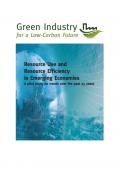This document is a review of the low carbon growth studies conducted in six emerging economies: Brazil, China, India, Indonesia, Mexico and South Africa. These countries, with the help of the Energy Sector Management Assistance Programme (ESMAP), have initiated country specific studies to assess development goals in conjunction with greenhouse gas mitigation opportunities. The aim is to present a framework for other countries who wish to implement studies of their own.
The paper is structured to mirror the seven step process of establishing a low carbon growth country study.
This paper highlights the implications of the current separation of the discourses on private climate finance (PCF) and on subsidies, and the opportunities that exist to unlock climate-compatible investment by linking these fields.
Though climate finance aims to enable climate compatible development (CCD), this paper points out that, within developing countries, subsidies to fossil fuels (alone) currently dwarf any efforts toward CCD through climate finance.
This is the third review of Mexico's environmental performance. It analyses progress in achieving a range of national objectives and international commitments, and presents 29 recommendations on how performance could be improved. Progress towards a green, low carbon economy is part of the assessment.

This report examines patterns and trends in resource use and resource efficiency in 16 selected emerging economies between 1985 and 2005. In order to facilitate comparison, the authors divided these countries into three different groups according to their dominant strategy of economic development since 1985: resource-based economies with a high ratio of raw materials in exports, including Algeria, Argentina, Brazil, Chile, Morocco, Russia and South Africa; industry-based economies which have been expanding their capacity to produce manufactured goods and related services, including China, Costa Rica, Malaysia, Mexico and the Republic of Korea; and services-based economies that have largely based their development since 1985 on services (e.g. tourism, financial or knowledge-based industries), including Barbados, Egypt, India and the Seychelles. While none of these three development paths is exclusive, they are useful categories for analytical purposes, as each is linked to specific physical or material profiles in terms of resource use and resource productivity.
The document presents a series of climate change-related projects that the International Finance Cooperation (IFC) has supported from all around the world. It also contains a series of tools for green investors, including:
